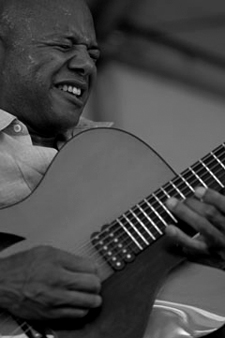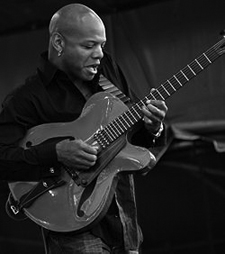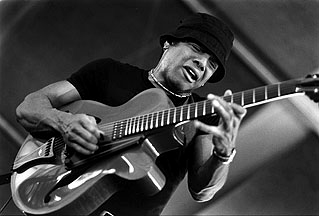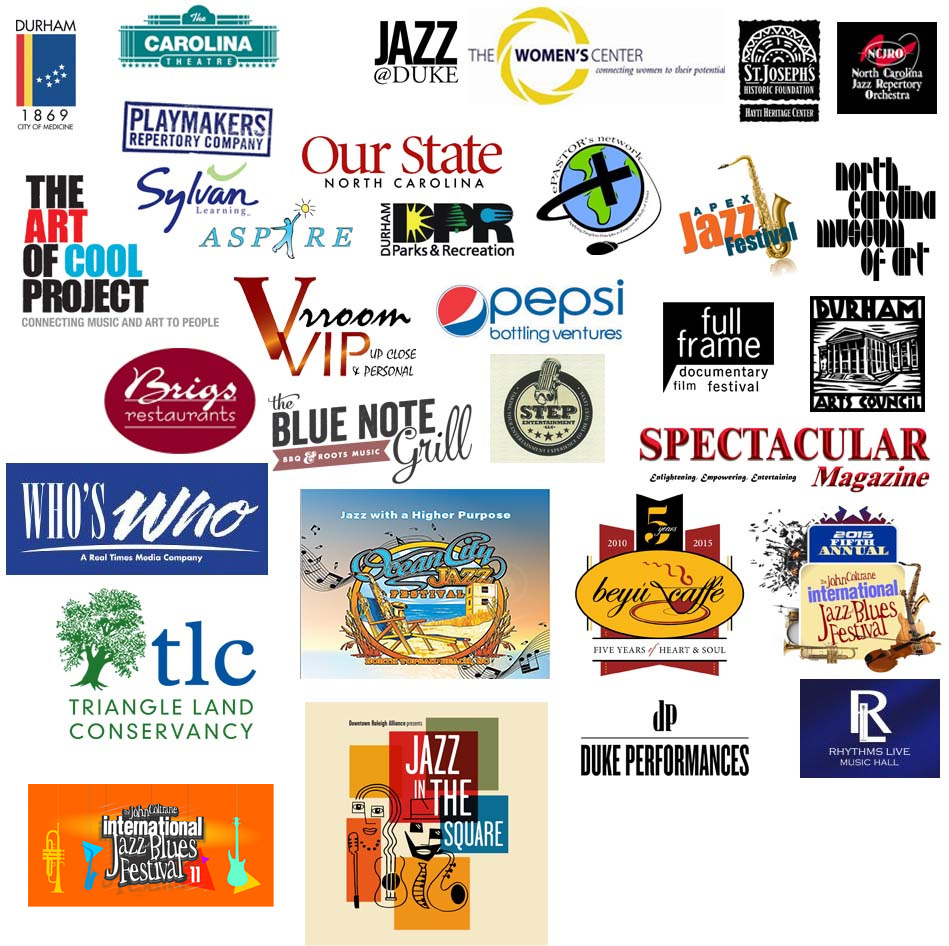Mark Whitfield
 Mark Whitfield was born in October 1966 in Long Island, New York. The youngest of five, his love for jazz and blues music came early. At the age of 15, all his siblings were moving into careers as doctors and lawyers and Whitfield himself, had obtained a medical student internship at Georgetown University. While that’s impressive for any 15-year-old, it was the scholarship he won to the Berklee College of Music, in Boston, which excited him even more. After his family moved across the country to a suburb of Seattle, Whitfield convinced his parents to let him attend Berklee after graduating from high school early, at the age of 16. It was while studying the guitar at Berklee where Whitfield met a young piano and vocal student from Baton Rouge, Louisiana, named Jody Davis.
Mark Whitfield was born in October 1966 in Long Island, New York. The youngest of five, his love for jazz and blues music came early. At the age of 15, all his siblings were moving into careers as doctors and lawyers and Whitfield himself, had obtained a medical student internship at Georgetown University. While that’s impressive for any 15-year-old, it was the scholarship he won to the Berklee College of Music, in Boston, which excited him even more. After his family moved across the country to a suburb of Seattle, Whitfield convinced his parents to let him attend Berklee after graduating from high school early, at the age of 16. It was while studying the guitar at Berklee where Whitfield met a young piano and vocal student from Baton Rouge, Louisiana, named Jody Davis.
Whitfield’s tenure at Berklee was not as smooth as his acceptance to the school had been. He wanted to play traditional mainstream jazz, which was not in vogue at Berklee at the time. “I was looking for pure sound, a hollow-body guitar, a small amplifier, no effects,” he told Offbeat. He found a core of jazz purists that he could jam with, which included Delfeayo, Wynton, and Branford Marsalis.
At the age of 20, Whitfield graduated, married Jody, and the couple moved to a small studio apartment in Brooklyn, New York. Whitfield’s sister was a stockbroker and got him a position as a stockbroker’s assistant. More importantly, his brother-in-law, drummer Tory Davis, got him a job playing with the after-hours house band at the famous Blue Note jazz club in Greenwich Village.
 Later that same year, he was playing at the club’s 25th anniversary party when legendary jazz guitarist George Benson heard him. Benson was impressed and arranged for him to work with celebrated organist Jack McDuff. McDuff was not especially enamored of Berklee graduates but let him play with his band. It was a learning experience for Whitfield who incorrectly assumed he had a sophisticated theoretical and harmonic background. McDuff soon set him straight, “Stop playing those banjo chords,” he told Whitfield.
Later that same year, he was playing at the club’s 25th anniversary party when legendary jazz guitarist George Benson heard him. Benson was impressed and arranged for him to work with celebrated organist Jack McDuff. McDuff was not especially enamored of Berklee graduates but let him play with his band. It was a learning experience for Whitfield who incorrectly assumed he had a sophisticated theoretical and harmonic background. McDuff soon set him straight, “Stop playing those banjo chords,” he told Whitfield.
In 1990, around the time his debut album came out, Whitfield and Jody discovered they would soon be parents. They decided to move to Jody’s home town of Baton Rouge, to raise their child in a more traditional family setting. There, Whitfield met saxophonist Alvin Batiste, head of Southern University’s jazz program, who soon became his mentor. He began playing with his old classmate, Delfeayo Marsalis, and through him met other members of the New Orleans jazz community, including trumpeter Nicholas Payton. Since then, the two have played on each other’s albums and as backing musicians for famed organist Jimmy Smith.
 Whitfield’s second album, Patrice, was released in 1991. More avant garde than his previous album, it again did well with the critics but not in sales. In 1993, while working on his third album he had been persuaded to try a more salable approach and the smooth jazz of his Kenny G-style work produced a modest success. Whitfield toured with a large band for a few months but found he disliked playing pop songs. He returned to playing more traditional jazz with a trio and in turn confounded the audiences, who were expecting his pop material. “The alternative is, you sell out your musical and artistic vision,” he told Keith Spera of Offbeat. “If it’s not a huge commercial success, then you’re a complete failure–you have no recourse. You weren’t successful as a jazz musician, you weren’t successful as a pop musician. What do you do now?”
Whitfield’s second album, Patrice, was released in 1991. More avant garde than his previous album, it again did well with the critics but not in sales. In 1993, while working on his third album he had been persuaded to try a more salable approach and the smooth jazz of his Kenny G-style work produced a modest success. Whitfield toured with a large band for a few months but found he disliked playing pop songs. He returned to playing more traditional jazz with a trio and in turn confounded the audiences, who were expecting his pop material. “The alternative is, you sell out your musical and artistic vision,” he told Keith Spera of Offbeat. “If it’s not a huge commercial success, then you’re a complete failure–you have no recourse. You weren’t successful as a jazz musician, you weren’t successful as a pop musician. What do you do now?”
In 1994, Whitfield moved to the Verve record label and returned to his jazz and blues interests with True Blue, an album that featured seven original compositions and six jazz classics. The combination garnered both critical praise and impressive sales. “The maturation process of this standout jazz guitarist continues unabated,” wrote Bob McCullough in the Boston Globe. It was followed by 7th Ave. His new life in Louisiana had helped move his playing beyond the styles he learned in Boston and New York. Stroll readily calls to mind the eastern urban ambiance of his beginnings at the Blue Note.

